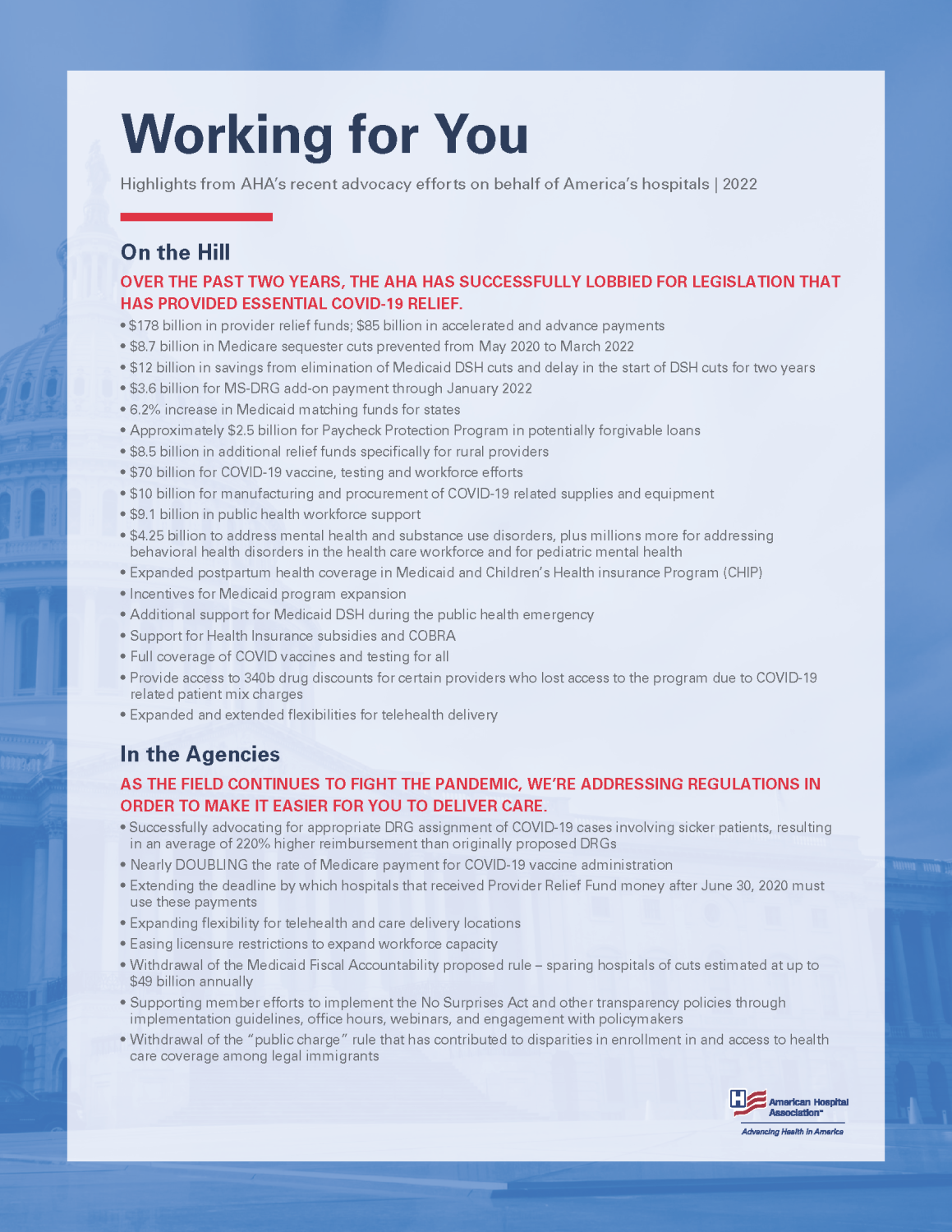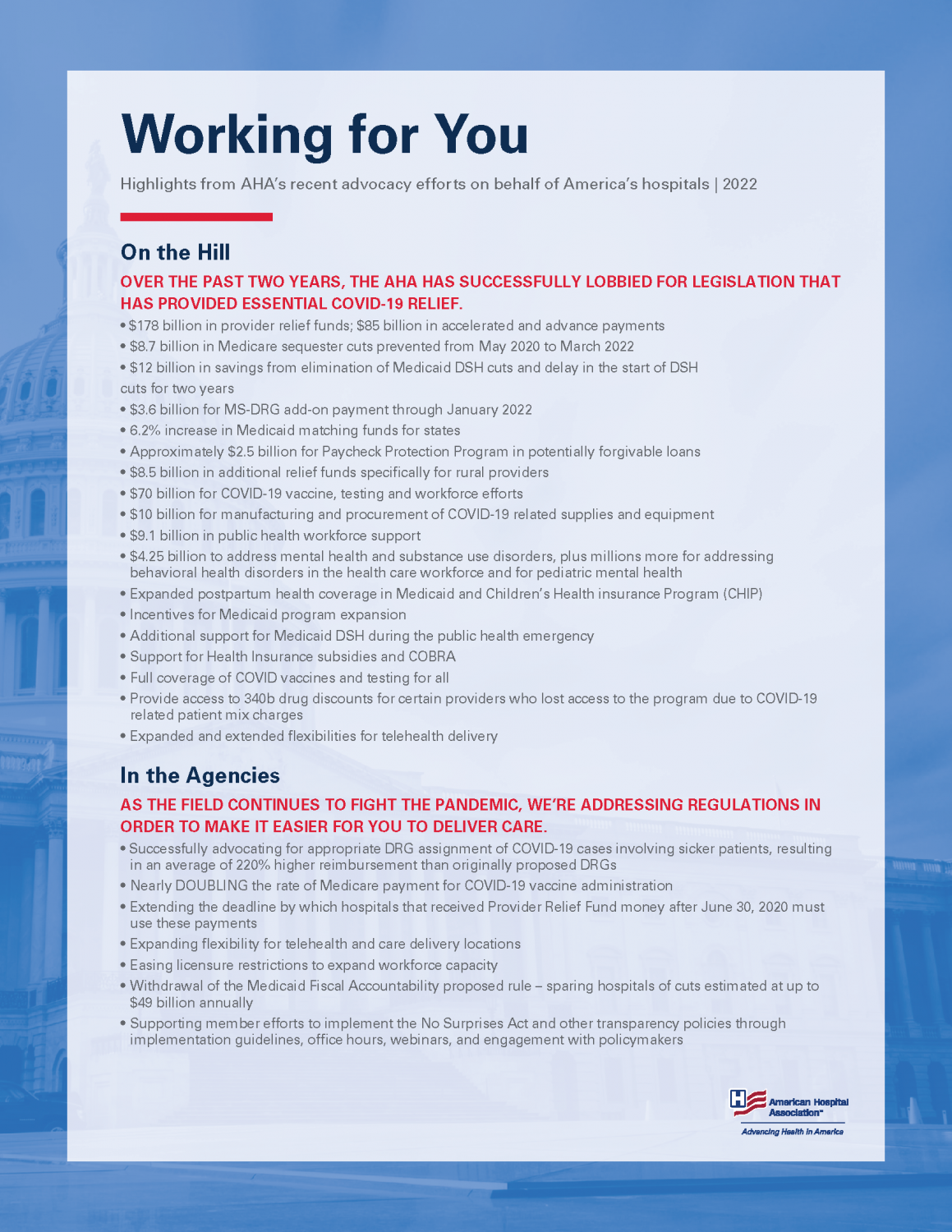Highlights from AHA’s recent advocacy efforts on behalf of America’s hospitals
June 2022
On the Hill
OVER THE PAST TWO YEARS, THE AHA HAS SUCCESSFULLY LOBBIED FOR LEGISLATION THAT HAS PROVIDED ESSENTIAL COVID-19 RELIEF.
- $178 billion in provider relief funds; $85 billion in accelerated and advance payments
- $8.7 billion in Medicare sequester cuts prevented from May 2020 to March 2022
- $12 billion in savings from elimination of Medicaid DSH cuts and delay in the start of DSH cuts for two years
- $3.6 billion for MS-DRG add-on payment through January 2022
- 6.2% increase in Medicaid matching funds for states
- Approximately $2.5 billion for Paycheck Protection Program in potentially forgivable loans
- $8.5 billion in additional relief funds specifically for rural providers
- $70 billion for COVID-19 vaccine, testing and workforce efforts
- $10 billion for manufacturing and procurement of COVID-19 related supplies and equipment
- $9.1 billion in public health workforce support
- $4.25 billion to address mental health and substance use disorders, plus millions more for addressing behavioral health disorders in the health care workforce and for pediatric mental health
- Expanded postpartum health coverage in Medicaid and Children’s Health insurance Program (CHIP)
- Incentives for Medicaid program expansion
- Additional support for Medicaid DSH during the public health emergency
- Support for Health Insurance subsidies and COBRA
- Full coverage of COVID vaccines and testing for all
- Provide access to 340b drug discounts for certain providers who lost access to the program due to COVID-19 related patient mix charges
- Expanded and extended flexibilities for telehealth delivery
In the Agencies
AS THE FIELD CONTINUES TO FIGHT THE PANDEMIC, WE’RE ADDRESSING REGULATIONS IN ORDER TO MAKE IT EASIER FOR YOU TO DELIVER CARE.
- Successfully advocating for appropriate DRG assignment of COVID-19 cases involving sicker patients, resulting in an average of 220% higher reimbursement than originally proposed DRGs
- Nearly DOUBLING the rate of Medicare payment for COVID-19 vaccine administration
- Extending the deadline by which hospitals that received Provider Relief Fund money after June 30, 2020 must use these payments
- Expanding flexibility for telehealth and care delivery locations
- Easing licensure restrictions to expand workforce capacity
- Withdrawal of the Medicaid Fiscal Accountability proposed rule – sparing hospitals of cuts estimated at up to $49 billion annually
- Supporting member efforts to implement the No Surprises Act and other transparency policies through implementation guidelines, office hours, webinars, and engagement with policymakers
- Withdrawal of the “public charge” rule that has contributed to disparities in enrollment in and access to health care coverage among legal immigrants
- Urging CMS to make permanent some of the waivers on telehealth, hospital at home, and other new ways to deliver care to allow hospitals to meet the needs of their patients in new and different ways
- Supporting expansion of the health insurance marketplaces, including a longer open enrollment period and increased funding for outreach and enrollment activities and the navigator program
- Convincing CMS to rescind its audit determinations for providers notified in January 2021 that they had failed to qualify for the “mid-build exception”
- Successfully urging the Administration to delay tariff increase on Chinese-made medical goods needed to address the COVID-19 pandemic
- Convincing CMS to reinstate the list of services paid for only when performed in an inpatient setting as well as several patient safety criteria for allowing procedures to take place in ambulatory surgical centers
In the Field
SOUNDING THE ALARM ON THE WORKFORCE CRISIS
- Calling for the investigation of nurse staffing agency pricing practices
- Lifting the cap on Medicare-funded residencies
- Increasing funding for nursing schools and faculty
- Fast-tracking visas for international health care workers
- Providing funding and flexibility to address the mental health needs of health care workers
STANDING UP TO COMMERCIAL HEALTH PLANS
- Getting bi-partisan, bi-cameral legislation introduced with more than 250 co-signers to streamline prior authorization processes in the Medicare Advantage program
- Encouraging the federal government to tighten rules around prior authorization and support streamlined processes, resulting in a federal RFI on electronic prior authorization
- Advocating successfully for CMS to encourage Medicare Advantage plans to waive prior authorization during the PHE, an issue on which the agency is now seeing additional input
- Successfully arguing that United Healthcare should pull back from plans to deny coverage for emergency department claims the insurer deems non-emergent, and achieving a stern warning to health plans about denying ED claims in the first regulation implementing the No Surprises Act
- Successfully petitioned CMS to issue guidance protecting members from health plan and vendor programs that charged providers a percentage of their reimbursement to receive claims payments
- Successfully advocated that UHC suspend its unique lab testing program requiring hospital laboratories to register and report unique codes on claims for lab services
LEADING THE WORK TO COMBAT VACCINE HESITANCY
- Creating viral campaigns and public service announcements to encourage caregivers and communities to make the choice to get vaccinated against COVID-19. Initiatives have targeted communities of color and leveraged social media, clinician ambassadors, media outreach and positive stories on creative community outreach strategies
In the Courts
- Successfully arguing to block the acquisition of Change Healthcare by United Healthcare
- Successfully arguing for elimination of elements of surprise billing arbitration rule that unfairly favor health insurers and do not match up with the text of the No Surprises Act
- Winning a Supreme Court case that reverses an earlier lower court decision that would have significantly cut payments to certain hospitals in the 340B Drug Pricing Program.


